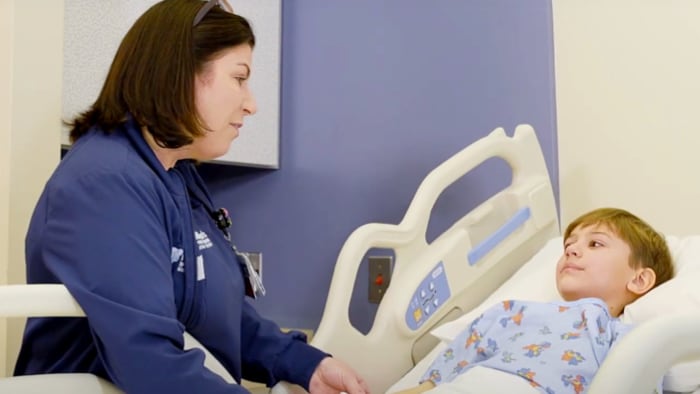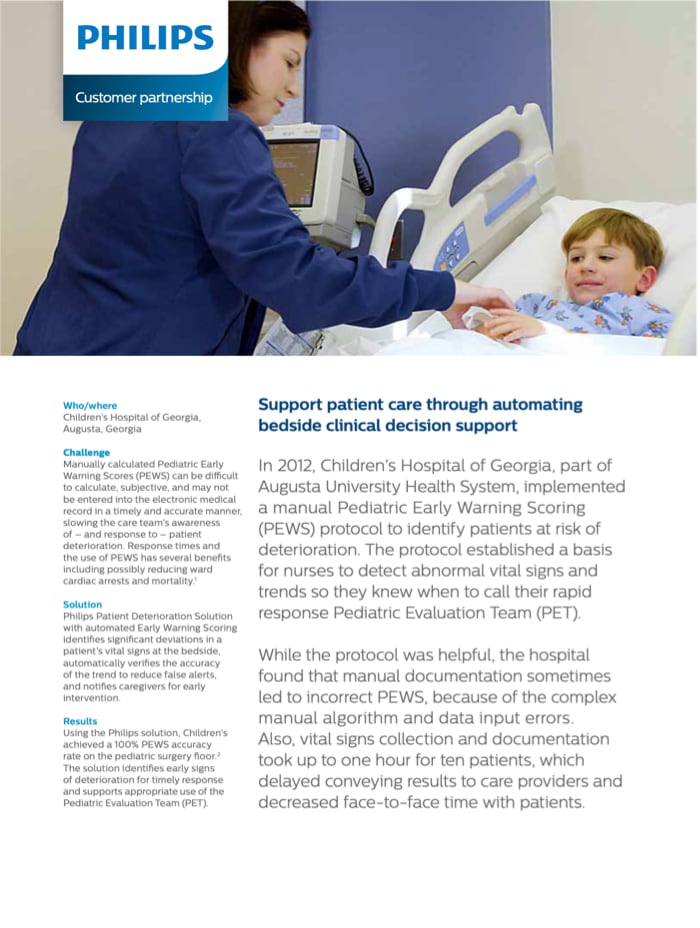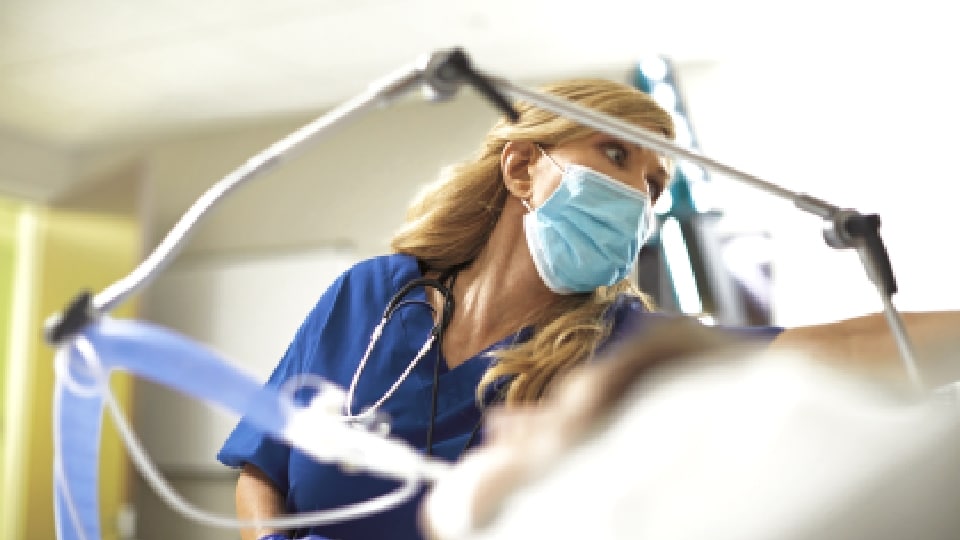IX 30, 2022 by Philips
Reading time: 4-5 minutes
Automated Pediatric Early Warning Scoring decreases scoring inaccuracies and supports nursing staff

Just like manual calculation of Early Warning Scores for adult patients, manual Pediatric Early Warning Scores (PEWS) can be subjective, are subject to input errors and may vary based on the expertise of the staff. However, PEWS have an additional complication: normal values vary significantly depending on the age of the patient, and nurses must assess and remember normal values for patients ranging from premature infants to age 21.
Even when scores are accurate, if they are not entered into the electronic medical record in a timely manner, they can slow the care team's awareness of – and response to – patient deterioration. This response time is critical, because if acute changes can be addressed as soon as they appear, children have a better chance of survival.1
After entering a long-term partnership with Philips, Children’s Hospital of Georgia began using Philips patient deterioration solution with automated Early Warning Scoring. The solution identifies significant deviations in a patient’s vital signs at the bedside, automatically verifies the accuracy of the trend to reduce false alerts, and notifies caregivers for early intervention. Using the Philips solution, Children’s achieved a 100% PEWS accuracy rate on the pediatric surgery floor2 and a 75% accuracy on the medical floor.3

The solution consists of Philips vital signs monitors, IntelliVue Guardian Software and Philips Professional Services. The vital signs monitors calculate PEWS according to the hospital's protocol and send them to IntelliVue Guardian Software, which analyzes trends and alerts caregivers of patients at risk of deterioration.
Automatic calculation gives caregivers support to call for the additional resources that their patients may need. It is important to get results in the record in a timely manner, and to have the data at our fingertips to be able to make decisions proactively rather than reactively."
Kim Basso
Director of Women and Children’s Services

Automating bedside clinical decision support
Learn more about how Children’s Hospital of Georgia uses Philips patient deterioration solution with automated Early Warning Scoring to identify significant deviations in vital signs at the patient’s bedside.
Eases documentation process
Prior to using the Philips solution, vital signs collection and documentation took up to one hour for 10 patients, which delayed conveying results to care providers and decreased face-to-face time with patients. “The implementation of the Philips system has made nursing documentation very easy,” notes Dr. Renuka Mehta, professor, Department of Pediatrics at the Medical College of Georgia at Augusta University and medical director of the CPR committee. “The staff spends less time working in the electronic medical record system because PEWS are available at the bedside immediately when the vital signs have been taken. This has also increased staff satisfaction because they don't have to spend time remembering all the elements of PEWS scoring.”
The staff spends less time working in the electronic medical record system because PEWS are available at the bedside immediately when the vital signs have been taken.”
Dr. Renuka Mehta
Professor, Department of Pediatrics at the Medical College of Georgia at Augusta University and medical director of the CPR committee
May eliminate potential for human error
The Philips Patient Deterioration Solution also eliminates the potential for human error in recording vital signs. Amy Bales, nurse manager in the pediatric ICU, points out, “With (the solution), you scan the patient and the vital signs go directly from the monitor to (IntelliVue Guardian Software). There’s no chance that you assigned the data to the wrong patient or wrote the numbers down wrong."
Solution provides confidence for less experienced staff
Like many hospitals, Children’s faces staff shortages and turnover, and uses floating staff as part of its staffing strategy. The Patient Deterioration Solution has helped Children's mitigate the challenges of using caregivers who are not experienced with the PEWS protocol. “We’re always getting new nurses in, and they may not have used PEWS in another hospital," Hood says. "However, when you have a system that has PEWS already built in, it helps them understand it better.”
Provides nursing support
The Philips solution supports good nursing. Dr. Metha says, "I feel confident that we have had patients on the floor who were becoming critically ill and having subtle changes that might not be picked up on, and trends that might not otherwise have been noticed as quickly that have been noticed more quickly due to the use of the (Philips) system." Disclaimer: Results are specific to the institution where they were obtained and may not reflect the results achievable at other institutions.
Learn more about PEWS at Children’s Hospital of Georgia.
1 Bonafide CP, Localio AR, Roberts KE, Nadkarni VM, Weirich CM, Keren R. Impact of rapid response system implementation on critical deterioration events in children. 2 Customer data over seven-month period in 2019 in unit 5CMC – Pediatrics Surgery. 3 Customer data over seven-month period in 2019 in unit 5CMC – Pediatrics Medicine.
JAMA Pediatrics. 2014 Jan;168(1):25-33.
Explore our acute patient management products and capabilities
Share this case study
Sign up to receive news and updates from Philips.
At a glance Challenge Solution Results
Children’s Hospital of Georgia Augusta, Georgia USA
Manually calculated Pediatric Early Warning Scores (PEWS) can be difficult to calculate, subjective and may not be entered into the electronic medical record in a timely and accurate manner, slowing the care team’s awareness of – and response to – patient deterioration.
Philips Patient Deterioration Solution with automated Early Warning Scoring
Explore more
-
![Solutions to help boost clinician satisfaction and confidence]()
Solutions to help boost clinician satisfaction and confidence
Read the story -
![What can help clinicians cut through the noise to get actionable insights?]()
What can help clinicians cut through the noise to get actionable insights?
Read the story



